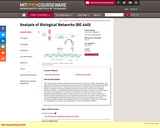
This class analyzes complex biological processes from the molecular, cellular, extracellular, and organ levels of hierarchy. Emphasis is placed on the basic biochemical and biophysical principles that govern these processes. Examples of processes to be studied include chemotaxis, the fixation of nitrogen into organic biological molecules, growth factor and hormone mediated signaling cascades, and signaling cascades leading to cell death in response to DNA damage. In each case, the availability of a resource, or the presence of a stimulus, results in some biochemical pathways being turned on while others are turned off. The course examines the dynamic aspects of these processes and details how biochemical mechanistic themes impinge on molecular/cellular/tissue/organ-level functions. Chemical and quantitative views of the interplay of multiple pathways as biological networks are emphasized. Student work will culminate in the preparation of a unique grant application in an area of biological networks.
- Subject:
- Biology
- Chemistry
- Life Science
- Physical Science
- Material Type:
- Full Course
- Provider:
- M.I.T.
- Provider Set:
- M.I.T. OpenCourseWare
- Author:
- Essigmann, John
- Sasisekharan, Ram
- Date Added:
- 01/01/2004
